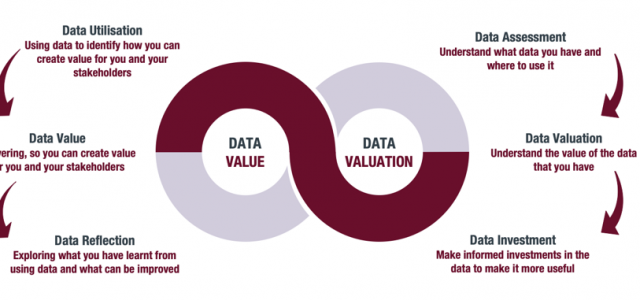Data Valuation — What is Your Data Worth and How do You Value it?

Some people talk about data as the new oil, but this is too simplistic. Oil is a commodity–to be bought and sold. Data is an asset, an asset that grows in value through use. A single person’s data is not very valuable. Combining the data generated by thousands of people is a completely different story. Coupling that with data generated in different situations, combining datasets, creates new insights and value for different actors and stakeholders.
[Related Article: Avoiding Dangerous Judgment Errors in Using Data to Make Important Leadership Decisions]
If data is so valuable, then why do so few firms value it? Some seek to work out a price for their data. They try to understand what the market will pay for it. But the value in data does not always lie in its sale. Take Amazon and Alibaba, for example. Both firms are seeking to optimize a marketplace; to connect customers with a demand, or to organizations that can supply. Individual consumers provide data on what they want and need. Amazon and Alibaba use this to match the consumers to providers with the right products and services. They also aggregate the data to provide insights into market trends and shopping patterns. They don’t sell data, at least not as their primary service, but they do use it extensively to optimize their processes.
This is not about selling data–it is realizing that data is the lifeblood of an organization.
The value of data to Amazon and Alibaba is not captured in a pricing approach. Yes, their data may be valuable to third parties, but it is more valuable to the firms themselves as they seek to optimize their operation. Indeed, without data, they could not continue to operate.
So, we can’t think of data value as simply the price others are willing to pay. We have to think more widely and in doing so we have to create methodologies for data valuation. This distinction, from data value to data valuation, is critically important. Data value is a property. Your data has a certain value and you need to understand what this is in order to make appropriate investment decisions to support your data. To understand the value of your data you need a methodology for data valuation. You need a way of working out what the actual value of your data is.
One way to think about this is to ask the question, why would I want to put a value on my data? Think of data as an asset; organizations deploy assets to create value for different stakeholders. They also invest in assets to make them fit for purpose and, at any point in time, they have to consider which assets are worth investing in. You can think of this as the data value/data valuation cycle. You have to assess and understand what data you have (data assessment). You have to put a value on this data (data valuation) so your people recognize the value of data, treat it with respect inside your organization and work out how to make it more valuable. From this, you then have to invest (data investment) to make sure your data is fit for purpose. You have to ensure you have good governance in place, an appropriate data strategy, standards, systems and procedures to ensure you achieve good data quality.
Once you have good data you can start to use it (data utilization). This is centered around identifying how you can use data to create value for you and your stakeholders. This may be through better operations. It may be through more efficient delivery of products and services. It may be by using the data to generate new and meaningful insights that are, in themselves, valuable. Then you can create data value–by acting upon these insights. Finally, you have to review what you have learnt (data reflection), asking yourself, what have we learned from applying our data? How could we do this better in the future? Are there new and different datasets we need to access?

This cycle is endless–you oscillate between the data valuation and data value phases. But the start of the cycle is data valuation, something that has been spoken about for many years, but no one has been able to properly implement and that is partly why so many data initiatives fail. This is until now. Anmut have completed the development of a rigorous methodology for valuing data and worked with a large public sector organization to implement it.
[Related Article: The Mechanics and Business Value of Speech Technologies]
Come to ODSC Europe on the 21st November to see how Anmut did it at the talk “Data Valuation — Valuing the World’s Greatest Asset.” You will learn how you can transform the way data is seen through your organization, from a systemic disadvantage into a competitive advantage! Find out more at www.anmut.co.uk.
Read more data science articles on OpenDataScience.com, including tutorials and guides from beginner to advanced levels! Subscribe to our weekly newsletter here and receive the latest news every Thursday.
